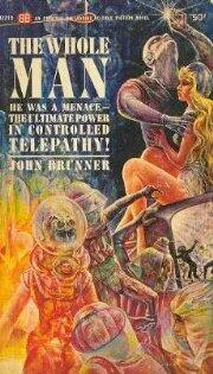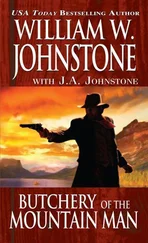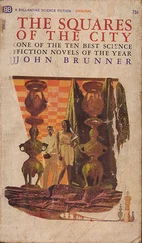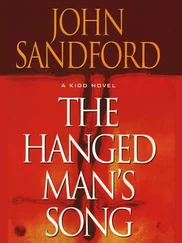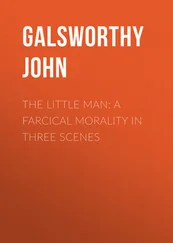Howson almost choked before he could reply; when he did, it was with such a blaze of fury that he used projection instead of words.
How can you be so casually selfish? Don’t you care about the worry and trouble you’ve caused? Don’t you care about the annoyance to me personally? What about the time I wasted — time I could have given to somebody in real need?
Choong cried out and put his hand to his head. The door of the room slammed back and a nurse looked in to ask what was wrong. Recovering, Choong waved her away, and with a suspicious glance at Howson she complied.
“You have some power on you!” Choong said. “Do you mind sticking to speech ? My mind feels rather — ah — bruised from your earlier shock tactics.”
Howson remained sullenly mute.
“Did it honestly not occur to you that I wouldn’t resist?” Choong pursued. “Yes, I see it was so, right up till the last moment! I find that astonishing, if you’ll forgive my saying so. You must have jumped to the conclusion that the only reason a telepathist could wish to set up a catapathic grouping was to escape; it never struck you that I might simply wish to exercise my talent for its own rewarding sake!”
“Don’t gloat,” Howson muttered. “I know I could never have dragged you back if you hadn’t co-operated.”
“No, I think you’re missing the point.” Choong activated the headboard of the bed and got himself into a more comfortable position from which to look at Howson. “Damn it, How-son, you wouldn’t blame a man with physical gifts for enjoying himself at sports. Yet it seems to me that you have a block against the idea that telepathy can be used for pleasure. Why ? You have a fabulous talent! And I’m by no means so sure you wouldn’t have got me back even if I had resisted — the sudden final inspiration was brilliant, and took me absolutely by surprise. Don’t you ever get any fun out of your gift? For instance, my wife and I usually link up before we go to sleep; I dream much more vividly than she does, and I like her to share my dreams.”
“I’m not married,” Howson said in a tight voice. Choong flashed an impolite glance into his mind, briefly vulnerable from the strength of his emotion. When he spoke again, it was with a change of manner.
“I’m sorry. That was tactless of me. But—”
“I—” Howson felt a stir of puzzlement. Why should he need to justify himself suddenly to this man who had put him to such trouble? But he did. Haltingly, he went on, “I’ve done that sort of thing. With a deaf-and-dumb girl I knew.”
“Well then! And you must enjoy your work to some extent. If for no other reason than that it makes a change to be a tough, resilient character capable of great physical effort.”
“I — yes, I do. I’m sometimes afraid of taking longer than necessary over a cure so that I can escape my limitations.” Howson licked his lips.
“That sounds dangerous,” Choong said judiciously. “My belief is that if you allowed yourself to derive more pleasure from your talent you wouldn’t be tempted to — ah — borrow other people’s fantasies.”
“What are you suggesting?” Howson demanded. “That I set up a catapathic grouping myself? How could I dare to? Even if I accepted your casual attitude towards them!” Vargas. and dust on his eyelids… “I wouldn’t have much incentive to come back to reality, would I? And whom could I trust to bring me back? I’ve demolished more catapathic groupings than anyone else alive — I know all the tricks and weak points On top of that, if someone did manage to fetch me back, what would happen to my confidence in my own ability?”
The nurse opened the door again. “Dr. Howson! Message from Dr. van Osterbeck — you’re not to undo your work by making Dr. Choong overtired!”
Howson made an empty gesture and turned to limp away. Behind him Choong spoke up one final time.
“Just because an escape which suits me or someone else doesn’t suit you, Howson, doesn’t mean there isn’t one for you. You’re a unique individual. Find your own way. There’s bound to be one!”
Howson wasn’t quite sure whether Choong had physically spoken those last few words, or eased them telepathically into his mind with the practised skill of a first-class psychiatrist implanting a suggestion in a patient. In a patient — that was funny! A few days before, Howson had been the doctor in charge; a moment had seen the roles reversed.
Except that Choong had never actually been the patient Howson had believed him to be.
He had already ordered his personal attendant to pack his bags. Now, outside Pandit Singh’s office, he found himself hesitating. Would he be able to make clear what he felt, what he wanted ? Did he in fact know himself what he wanted ?
He steeled himself and went in. Anything, surely, would be better than his present dilemma!
Singh didn’t raise his head from the mound of papers before him, merely waved at a chair. “Sit down, Gerry — won’t keep you a moment. Ah, there!” He scrawled a hasty signature on the topmost document and threw it into the out tray.
Leaning back, he said, “I agree, Gerry. You need a vacation.”
Not for the first time, not for the hundredth, Howson found he was wondering whether Singh had embryo telepathic faculties himself. Flushing, he said, “What—?”
“Oh, Gerry, for pity’s sake!” Singh rumbled a cheerful laugh. “I’ve been told about your bags being packed. When I heard, I calculated that it was six years since you last had a rest. It’s partly my fault — I’ve grown accustomed to leaning on you. But you haven’t seemed nearly as pleased as you should be with your success in Choong’s case, and my deduction is that you want a vacation. I’m glad you agree with me.”
Howson was silent for a long moment. Then he said, “Pan, I’m afraid you’re wrong.”
“You’re not—?” The suspicion that Howson was planning a permanent departure leapt up in Singh’s appalled mind.
“Ohhh!” In exasperation Howson cancelled the mistaken assumption with a telepathic correction, and went on aloud. “The Choong case wasn’t a success for me, Pan. He wanted to be brought back. If he hadn’t co-operated — or at least not resisted with any seriousness — I’d have been beaten.”
“Gerry, I don’t understand!”
“No? Nor did I, at first,” Howson agreed bitterly. “And Pak wouldn’t have told you, I guess, because I warned him not to until I had a chance to get used to the idea. Listen! All the telepathists I’ve previously routed out of their dreams were the inadequate personalities we assumed them to be, broken by the harshness of the world. Them I can tackle. Choong in full command of his faculties, in a world of his own devising and operating at his own whim, could have brushed me off like an annoying fly.
“He didn’t. He had the sense to see that he was going to have to help whoever came after him, as a precaution against enjoying his absolute power too greatly. So he followed sets of easily deducible rules. In particular, when he incorporated magic into his private universe, he employed the basic James Frazer rules of like-to-like and part-to-whole. I took him by surprise when I suddenly realized this during the crucial encounter, and — well, never mind the details. Just say that’s the only thing I’m pleased with, and it doesn’t satisfy me, because it was a lucky inspiration, not the result of planning and foresight.
“Pan, he’s punctured my confidence! I’ve had to admit something I’ve hidden for years from you, even from myself. I’m jealous of people who can escape into fugue! Why not? Look at me! And I’m scared because I’m jealous. There’s no one I know of who could come and get me back out of fantasy! Unless I do something to help myself, I’m apt to go into some patient’s universe and find it so much to my liking I don’t want to come back. I haven’t the guts to go into it the way Choong did. But I might well not have the guts to cut short a — a trip to some especially attractive fantasy.”
Читать дальше
